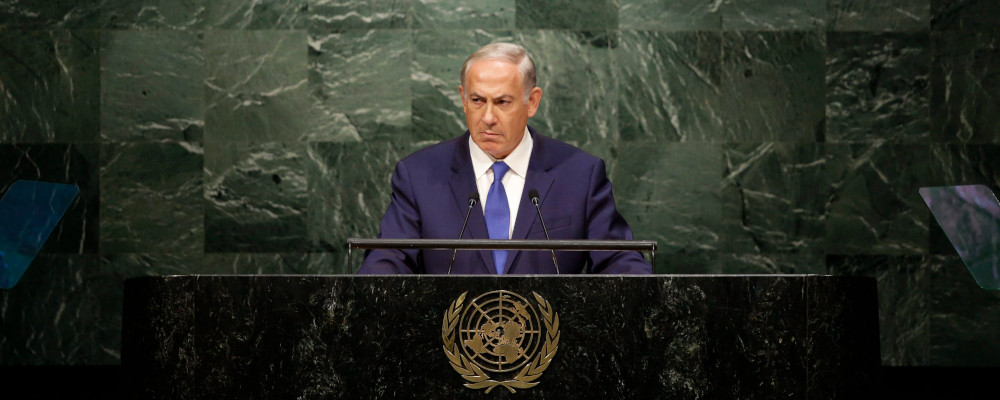This week’s absurd announcement that the International Criminal Court (ICC) has requested the issuing of arrest warrants for Israeli Prime Minister Benjamin Netanyahu and Defence Minister Yoav Gallant is a powerful sign of what many of us have known for some time: the United Nations architecture is falling apart.
The challenge now for U.S.-led Western democracies is to defend and revitalize the liberal and democratic rules-based order without being defensive about the inherent failings of today’s UN model. It’s no longer sustainable to ignore what’s happened to the 20th-century institution.
The UN and its various agencies epitomized the liberal international order in the aftermath of the Second World War and the Cold War. At various points over the years, it has lived up to its lofty goals. The problem today is that the UN has been increasingly subverted by those who want to destroy the peace and security that it has provided in large measure over the last almost 80 years.
Consider for instance that last year the Chinese Communist Party wrote in its defence white paper that the UN must be co-opted and used against the liberal order. Or consider Russia’s efforts to subvert the UN as part of its efforts to undo the U.S.-dominated world order. Or that Iran has previously chaired the UN Human Rights Council notwithstanding its appalling human rights record. Or that North Korea has been chair of the UN disarmament conference.

Name an undemocratic country and the despot (or despots) in charge, and you will find it on a list of UN committee chairs. Maybe it is the cost of keeping the unruly dangerous mob in the tent. Just maybe, though, it is gradual the end of the rule of law and the final subversion of the liberal rules-based order in which an international mob of dictators, antisemites, and systemic human rights abusers set the rules for the democracies trying to live and trade in peace.
The ICC’s issuance of arrest warrants for Israeli leaders has brought this to the fore. U.S. President Joe Biden has rightly called the decision “outrageous” and insisted there’s no equivalence with the brutal crimes of Hamas. As of writing, the Trudeau government has been largely silent on the subject. Its members of parliament have been free to set out positions in favour or opposed to the ICC’s extraordinary announcement. The Prime Minister has called it “unhelpful.”
Biden is right of course. The ICC is under pressure from the forces of antisemitism as well as the undemocratic mob of non-law-abiding states.
It must be understood though that while this is happening to Israel, it is not about Israel. At the end of the day, it is about all Western democracies.
The West led by the U.S. is now at a decision point with the manipulation and perversion of the ICC and the rule of international law. The Gaza War was of course thrust upon Israel by Hamas’ brutal attacks and even though Israel has a right to defend itself under the UN Charter, and in fact has gone further than any country in history to minimize civilian casualties, the ICC prosecutors if they have their way, will issue arrest warrants for Israel’s leaders for doing their job and defending the Jewish state.
If the mob succeeds in dragging Israeli leaders before the world court for defending their country, it amounts to the use of liberal institutions by illiberal forces to undermine a fellow democracy. It would effectively signal that the liberal international world order is at an end.
It’s a warning therefore to all Western liberal democracies. We can either try to revive the decaying rules-based order or subject ourselves to the old balance of power struck by great powers that so-typified the bloody war-dominated history of the previous three centuries.
We must understand this inherent choice. If the international order is permitted to unravel, states will be left to either join the balance of power game, sit out as neutral, or effectively surrender and become a vassal state. The problem with the neutral option is that such a country must arm to the hilt or risk being sucked into the fight either as an ally or a conquered vassal. That likely means the need for nuclear arms and delivery means.
As readers will no doubt conclude, this isn’t really much of a choice at all. Especially for a country like Canada.
Let’s hope therefore that our our democratically elected leaders choose wisely and defend Israel and its leadership from the tyranny of the mob because we cannot allow the rule of the dictators to win. The liberal international order itself may be at stake.
Recommended for You

‘Our role is to ask uncomfortable questions’: The Full Press on why transgender issues are the third rail of Canadian journalism

Need to Know: Mark Carney’s digital services tax disaster

‘They’re voting with their eyeballs’: Sean Speer on the revealed preferences of Canadian news consumers

‘I want to make Canada a freer country’: Conservative MP Andrew Lawton talks being a newbie in Parliament, patriotism, and Pierre Poilievre’s strategy



